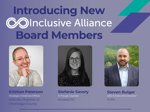%20(1260%20%C3%97%20400%20px)%20(Facebook%20Post%20(Landscape))%20(900%20x%20525%20px)%20(1600%20x%20500%20px).png?width=1600&height=500&name=5%20Tips%20How%20to%20be%20a%20Successfully%20affiliator%20(1260%20%C3%97%20630%20px)%20(1260%20%C3%97%20400%20px)%20(Facebook%20Post%20(Landscape))%20(900%20x%20525%20px)%20(1600%20x%20500%20px).png)
As the leaves of fall settle in Central New York, we at Inclusive Alliance are reminded that November isn't just a time for harvests and thanksgiving; it is also National Diabetes Awareness Month. This month serves as a powerful reminder of the ongoing fight against diabetes—a fight that is unequal in many ways. It's a time to reaffirm our commitment to bridging health disparities and ensuring that every resident has a fair chance to prevent and manage diabetes.
The Uneven Impact of Diabetes
Diabetes, particularly type 2 diabetes, remains a pressing public health concern. It's a condition that doesn't discriminate, affecting individuals from all walks of life. However, it's also a disease marked by notable disparities. Certain populations, including some racial and ethnic minorities, are disproportionately affected by diabetes, facing higher rates of the disease, its complications, and even death.
Diabetes strikes minority and low-income groups with a heavier hand, largely due to factors like access to care, socioeconomic status, and educational inequalities. These groups face higher rates of type 2 diabetes, more complications, and even premature death compared to their counterparts. It's a glaring example of health inequity, where one’s zip code can be more predictive of health than their genetic code.
Bridging the Health Divide
Knowledge is power, and empowerment is key in fighting diabetes. That's where evidence-based disease prevention and management programs like the National Diabetes Prevention Program (NDPP) come in. These initiatives have been shown to make real differences in the lives of those at risk for or living with diabetes. NDPP helps individuals make lifestyle changes that can stave off diabetes before it starts. They are lifelines for many, providing the education and support necessary to take control of their health.
In Central New York, the Inclusive Alliance is stepping up to lead this charge. Contracted by the diabetes program at the New York State Department of Health, and funded by the CDC, we are currently forming an Umbrella Hub for the NDPP. This means we will have a pivotal role in connecting local community-based organizations (CBOs) with the resources they need to offer programs and get reimbursed for the NDPP program.
By linking our local CBOs with modern healthcare payment systems, we can ensure that programs are not only available but also accessible to those who need them most. It's a step towards health equity, providing a foundation from which all residents can access preventive care and management tools, regardless of their income or racial background.
The Power of Community and Prevention
Prevention is often the best cure, especially with a condition like diabetes, where lifestyle changes can dramatically reduce one’s risk. Community-based organizations are instrumental in this preventive approach—they are the trusted faces in neighborhoods, the ones who can tailor programs to meet the unique needs of their communities.
Through our work with CBOs, we're helping to create a network of support that can reach into the heart of our most vulnerable communities, offering hope and tangible help where it's most needed.
Health Equity in Action
As we observe National Diabetes Awareness Month, let’s also celebrate the strides we're making towards health equity. Inclusive Alliance's role as an Umbrella Hub is more than just a title—it's a responsibility and an opportunity to reshape the healthcare landscape for the better.
Everyone, regardless of their background, deserves the chance to live a healthy life. This month, let's amplify this message and take action to ensure that diabetes prevention and care are within everyone's reach.
Stay connected with Inclusive Alliance this month as we explore the faces and stories of diabetes in our community, and the ways we're working to make health equity a reality. Together, we can turn awareness into action and create a healthier Central New York for all.


